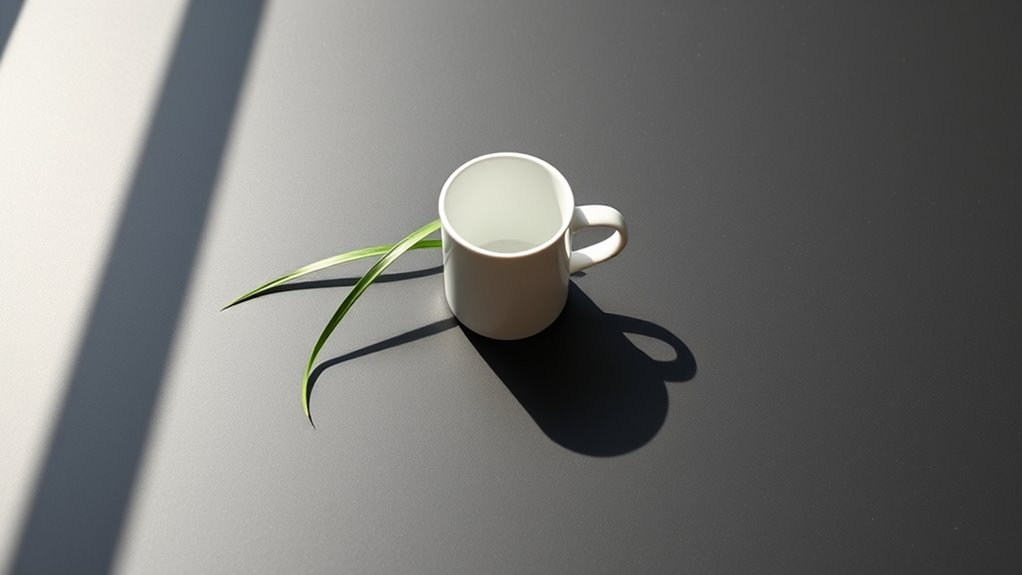Minimalism means doing more with less by focusing on quality over quantity and simplifying your environment. You create clarity and peace by removing clutter and choosing meaningful items. This lifestyle encourages intentional habits, helping you prioritize what truly matters. With fewer possessions and a balanced space, you’ll experience better focus, reduced stress, and more time for what’s important. Keep exploring to discover how embracing minimalism can transform your life and space.
Key Takeaways
- Simplify your environment by decluttering to focus on what truly matters and enhance mental clarity.
- Prioritize high-quality, meaningful possessions over quantity to create a purposeful and balanced space.
- Streamline routines and commitments to free up time and energy for what aligns with your values.
- Design spaces with clean lines and neutral tones to foster calmness and reduce visual distraction.
- Cultivate an intentional mindset by evaluating habits and saying no to non-essential distractions.

Have you ever wondered how simplifying your life can bring more clarity and peace? Embracing minimalism isn’t just about decluttering; it’s about creating a space that feels intentional and balanced. When you focus on space efficiency, you learn to prioritize what truly matters, making your environment more functional and less overwhelming. Instead of filling every corner with unnecessary items, you design your space to serve a purpose. This approach not only frees up physical room but also clears mental clutter, helping you feel more centered and in control.
Simplify your space to find clarity, balance, and a sense of control in your life.
A key aspect of minimalism is aesthetic simplicity. It’s about stripping away excess to highlight the beauty of what remains. When you adopt an aesthetic that favors clean lines, neutral tones, and uncluttered surfaces, your surroundings become calming rather than chaotic. This simplicity doesn’t mean bland or dull; it’s about creating a visual harmony that invites peace and focus. With fewer distractions, your mind can relax, and you can direct your energy toward activities that truly matter.
By choosing quality over quantity, you make smarter decisions about what to keep. You start to see that possessing fewer things allows you to invest in items that genuinely bring you joy and serve a purpose. This shift not only reduces clutter but also makes your daily routines more efficient. For example, having a well-organized kitchen with only essential utensils means less time searching for things and more time enjoying your meals or preparing new recipes.
Minimalism also encourages you to evaluate your habits and commitments. You learn to say no to activities and possessions that don’t align with your core values. This intentional living creates more space for meaningful experiences and relationships. With less clutter, your home becomes a sanctuary rather than a storage unit, and your mind becomes less distracted by unnecessary obligations or possessions.
Ultimately, embracing minimalism is about doing more with less—more peace, more clarity, more purpose. When your environment is streamlined, you find it easier to focus on what truly matters, whether that’s personal growth, relationships, or passions. It’s a mindset that empowers you to live intentionally, appreciating simplicity as a path to richer, more fulfilling living. By cultivating space efficiency and aesthetic simplicity, you create a life that feels lighter, more manageable, and deeply aligned with your true self. Recognizing the value of wealth and financial management can help you prioritize what truly matters in your life beyond material possessions.
Frequently Asked Questions
How Does Minimalism Impact Mental Health?
Minimalism boosts your mental health by fostering mental clarity, helping you focus on what truly matters. As you declutter your environment, you reduce stress and create a sense of calm. This simplicity also strengthens your emotional resilience, making it easier to handle life’s ups and downs. By embracing minimalism, you cultivate a healthier mindset, boost your overall well-being, and gain better control over your thoughts and emotions.
Is Minimalism Suitable for All Lifestyles?
Minimalism isn’t suitable for all lifestyles, especially if you value luxury possessions or dream of space travel, where abundance can symbolize success. If you prefer a simple, clutter-free environment, minimalism works well. However, if your lifestyle involves collecting luxury items or enjoying opulence, adopting minimalism might feel restrictive. Ultimately, it depends on your personal goals and values—choose what aligns best with your aspirations and daily life.
Can Minimalism Improve Financial Stability?
Yes, minimalism can improve your financial stability by promoting financial discipline and reducing unnecessary expenses. When you embrace a minimalist lifestyle, you focus on what truly matters, which helps you save more and avoid impulsive spending. This savings growth adds up over time, giving you a stronger financial cushion. By prioritizing essentials and cutting clutter, you gain better control over your finances, leading to increased stability and peace of mind.
How to Start Decluttering Effectively?
To start decluttering effectively, you should first focus on space optimization by sorting items into keep, donate, or discard piles. Address emotional clutter by asking yourself if each item truly adds value or joy. Tackle one area at a time, like a drawer or closet, to avoid feeling overwhelmed. Regularly reassess your belongings to maintain a clutter-free space that promotes clarity and calmness.
What Are Common Minimalism Misconceptions?
Ever think minimalism is just about having fewer things? Many believe clutter reduction means deprivation, but it’s about embracing lifestyle simplicity that enhances your life. Minimalism isn’t about perfection or losing personality; it’s about making space for what truly matters. Some assume you need to downsize drastically or live spartan, but it’s more flexible. The goal is mindful living, not extreme restrictions—so don’t let misconceptions hold you back from discovering its real benefits.
Conclusion
Imagine you’re holding a cluttered backpack, weighed down by everything you think you need. When you start to declutter, suddenly you move faster, breathe easier, and focus better. That’s what minimalism does—lightens your load so you can truly enjoy the journey. Just like Marie Kondo’s approach, stripping away excess reveals what truly sparks joy. Embrace minimalism, and watch your life become clearer, simpler, and more purposeful—because less really is more.










